Noah Rubin: Player — and now Podcaster — Extraordinaire
What's next for the former boy wonder from New York? A doc series and... tennis media domination?
Sep 3, 2024




Noah Rubin of Behind the Racquet tennis podcast at the at Lotte New York Palace Hotel for the 2023 Taste of Tennis with Venus Williams and her sister, Isha Price, the team supporting his new docu-series of the same name.
There was a seminal moment in the life of tennis player Noah Rubin in which the journeyman player decided that he needed to trade the instrument usually found in his right hand, for another.
Alone in a hotel one early morning in September 2018 before the first round of his next Challenger tournament — a stop on the endless week-in, week-out grind of chasing rankings points — Rubin had a think. He had just come off his best summer yet, beaten John Isner and “made some money, finally,” but something was still missing. “Was it trophies, more money, safety, I didn’t know, but I definitely didn’t have what I was looking for.” He hit a plateau, and anxiety and depression set in.
“I was working so hard, but the ranking system doesn’t reward anything but what you have done lately,” Rubin says on a phone call from his home in New York. “You win some points and you have to defend those points in the next month, so it’s constant stress. I said to myself, ‘it’s time to pull back the curtain; we’re all dealing with this, so why isn’t anyone saying anything?’”
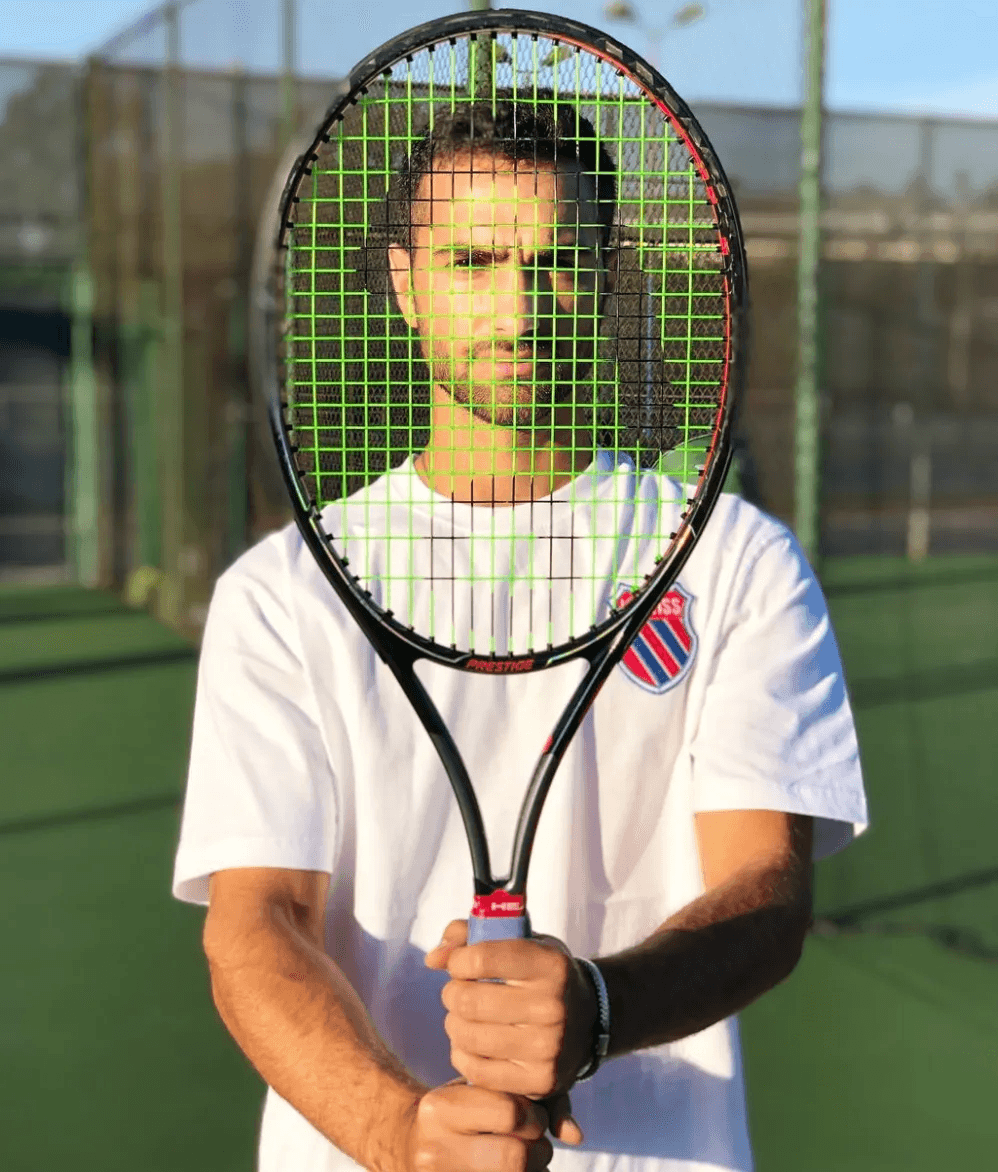
Noah Rubin, as the first official subject of his Behind the Racquet podcast, which he started in January 2019. “To let down the people closest to me, my friends and family, is my most daunting fear,” he revealed. “From an early age I was pretty aware about how many lives I affected. How many people had to sacrifice time, energy and money. The idea that it may not be worth it, or there might not be a way to repay them, haunts me at times. It’s what will take me to that next level, or break me, but to impact the world you cannot let that happen and I won’t.”
At first, Rubin downloaded a recording app and started taking his I-phone to the courts to record the stories of his friends on tour for an Instagram page. A few months later, he met fellow Long Islander, Zach Mitchell, then a producer in Los Angeles, and Rubin bought a microphone, a mixer and a podcast space to create Behind the Racquet, a podcast that “pulls back the curtain” on tennis players from World No. 1, Iga Świątek to doubles specialist, Marcus Willis, to community standout and coach, Jolene Watanabe, who passed away from cancer a few years ago. With five years of podcasting under his belt — always with play-by-play commentator and pundit Mike Cation on the other mike — Mitchell and Rubin have now set out to create the original product: a Behind the Racquet docuseries partnering with Wondermind, the company owned by sisters Venus Williams and Isha Price.
“The podcast has touched me in ways I would never have known had I remained just a player,” Rubin says. “I still get choked up thinking about the episode we did with Jolene and how after she died, her husband called and thanked us for doing it. Thanked us. Her story was so incredible and that all of it has come about from some dumb idea I had at 2 a.m. — unable to sleep in my hotel room before another tournament — still amazes me.”
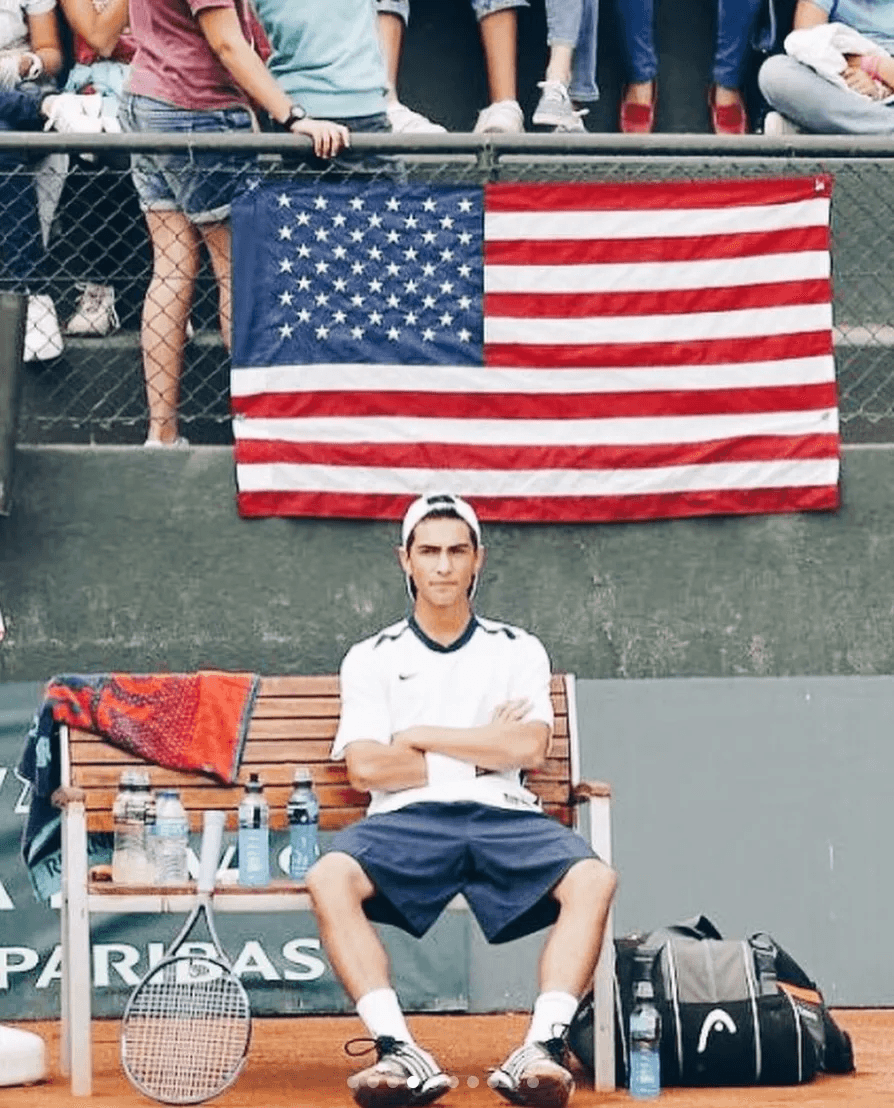
A pensive and pondering young Noah Rubin somewhere on the junior tour in Europe. The wunderkind from Long Island reached a career high of ITF Juniors No. 6 and at age 18 won the Junior Wimbledon title.
U.S. Open update: At some point in New York, all residents experience a bump on the subway or a step on the foot and a “F*^k you, no, f^#k you, no f^*k your mother, no yours,” exchange takes place. This U.S. Open Labor Day weekend had the equivalent of that sentiment at Rubin’s old stomping ground, the Billie Jean King Tennis Center in Flushing Meadows.
For starters, there was the grilling that Coco Gauff coach Brad Gilbert received from fellow ESPN pundit Rennae Stubbs over Gauff’s stunning exit in the fourth round after the third-seed — and 2023 champion — Gauff hit more double faults (19) than winners (14) on Sunday. “Where is Coco's confidence?,” Stubbs asked Glibert. “There’s no second serve… And that’s a problem. So under pressure, bad technique breaks down and her technique is… hard for me to say because Brad is sitting here… but her technique, the elbow, is too low, the grip is a little weird as well.” Gilbert, who couldn’t really defend himself, also raised questions about coaches being commentators. No word from the Coco camp, but many have called on her to axe him, including player-turned-pundit, Nick Kyrgios.
Next up, the Kazakh-Russian tennis player Yulia Putintseva’s stand-off with a U.S. Open ball girl, in which the ball girl tossed balls to a rude Putintseva, who just let them drop as she glared at the poor adolescent in rainbow Ralph Lauren kit. Putintseva lost to this year’s stand-out, the joyful Jasmine Paolini, who has become the poster girl for U.S. Open fun. Lastly, there was the double-handed backhand that No. 1 seed Iga Świątek took from Russian Anastasia Pavlyuchenkova — straight to the gut. Pavlyuchenkova apologized after the match, but following a summer of such tactics from Danielle Collins and others, Iga is feeling a bit of a target. But the tactic simply fired up the Polish introvert, who enacted her revenge by taking out Pavlyuchenkova 6-2, 6-4. The word is still out on how Serena Williams’ Monday hangover resolved after sucking down the signature Honey Deuce cocktail while watching it all.
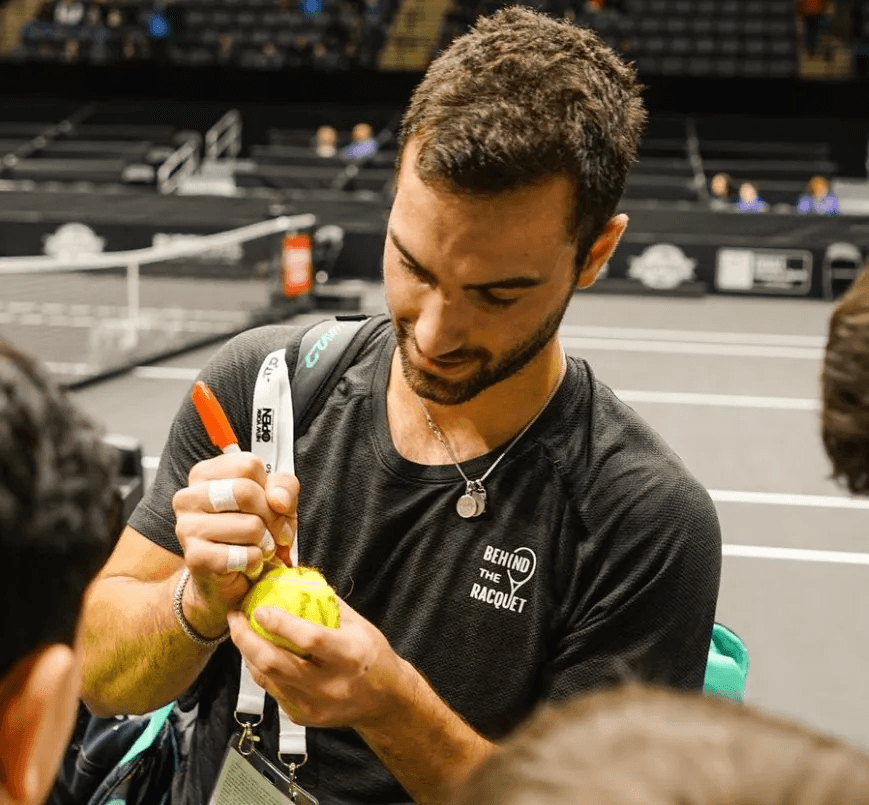
Rubin signs balls after a Behind the Racquet exhibition match.
Monday, however, brought the end of the fourth round with quarterfinals decided. Brazilian Beatriz Haddad Maia fought off returning retiree Caroline Wozniacki to earn the spot against Karolina Muchová, who undid fan fav Paolini. One of two American woman left standing, Jessica Pegula, will try to fight off Iga Świątek to avoid that last subway ride home. Aryna Sabalenka and Qinwen Zheng will do big forehand battle, with a dual between Emma Navarro and Paula Bedosa. For the men, quarter-final veterans Jannik Sinner and Danill Medvedev face off, as well as Taylor Fritz and Alexander Zverev. Alex de Minaur, whose 2024 Grand Slam runs all ended in the quarter-finals, takes on newbie quarter-finalist and Britain’s Next Great Hope, Jack Draper. Lastly, Francis Tiafoe looks to repeat his 2023 semi-final success against Grigor Dimitrov.
Back to Rubin: Born and raised in Long Island by tennis loving parents, Rubin started hitting balls at age one, literally a year after his parents — Eric, a banker, and Melanie, an educator — bought a junior racquet before their son was born. Childhood brought him to the John McEnroe Tennis Academy, where another Long Island son trained and prepared Rubin to be the best of the best. Rubin, who lived, breathed and even bar mitzvahed tennis, ascended quickly, winning major titles across the U.S and in 2014, defeated current ATP No. 12 Taylor Fritz en route to the Wimbledon boys singles title, ending a seven-year American drought at the competition. That year, he also won the USTA junior national championship titles in both singles and doubles before deciding to put off going pro and attend college at Wake Forest University.
After two years in North Carolina, however, Rubin felt a bit of FOMO for Fritz and the other guys on tour and decided to follow them, even after coming just a few points from winning the NCAA Championship. But the big dance proved different from his expectations. “Tennis is so demanding — so mentally and physically demanding — and unless you are wealthy or exceptional, you are on your own,” Rubin says. “It’s also a very self-centred sport, which requires thinking of yourself as number one most of the time — something that is difficult for people like me, who have other interests. You just don’t have this thought to go out of your way.”
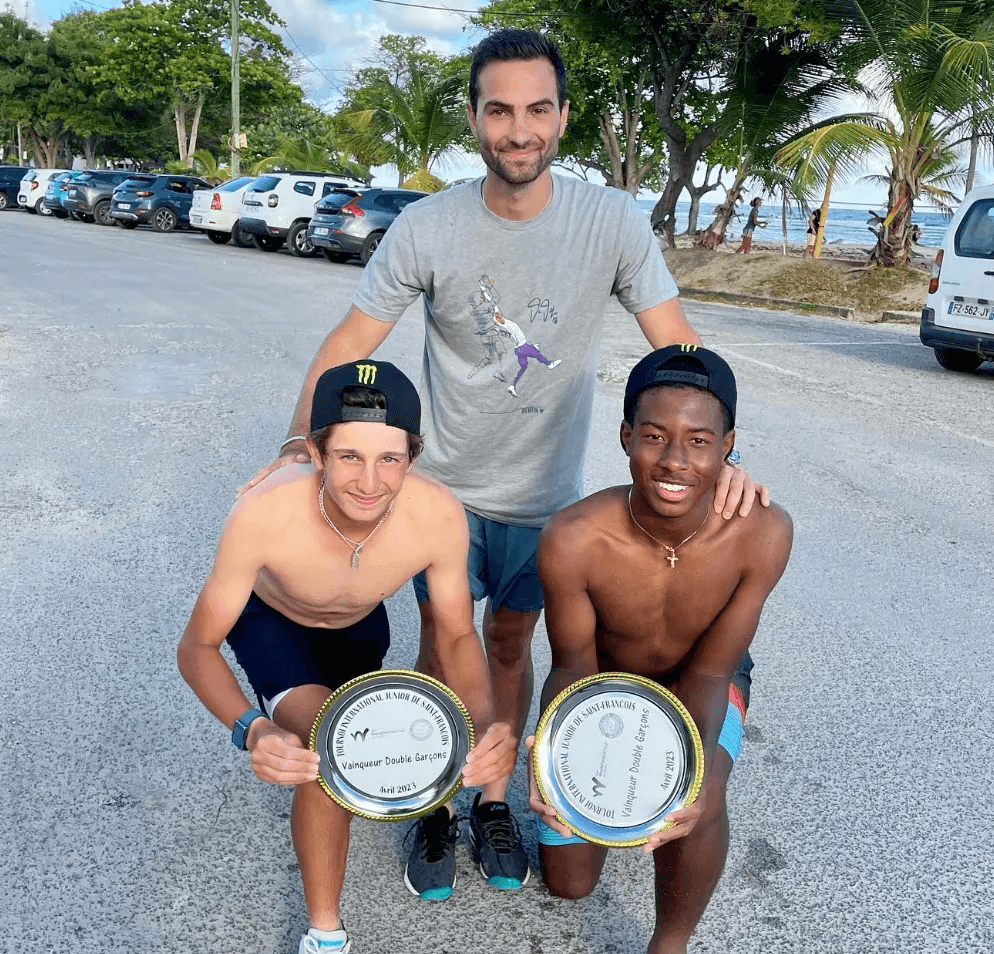
Noah Rubin after junior standout and protege, Sean Grosman, 17, and Zavier Augustin teamed to win an ITF Doubles Title in Guadeloupe earlier this year.
Inspired by the series, Humans of New York, Rubin started his Behind the Racquet Instagram and within just a few months, caught the attention of Zach Mitchell, yet another Long Island son who was living in Los Angeles and working as an assistant to Michael Douglas at Furthur Films. Mitchell saw the potential in Behind the Racquet straight away, envisioning it on TV. He dropped Rubin a DM on Instagram, and after the struggling player responded, Mitchell drove to the March 2019 BNP Paribas Open in Palm Springs to pitch his idea to Rubin — straight after Rubin lost his first-round match. “I went up to him probably not realizing it wasn’t the best time to talk to a player, but I shot my shot. He was so gracious and we had dinner later that night,” Mitchell says. “It was one of those, ‘when you have nothing to lose just go for it,’ moments.
“But Noah is one of a kind among tennis players — he is so full of charisma, tenacious, and smarter than the average tennis player. I knew he could pull this off.”
Rubin stayed on tour a while longer and planned on both playing and podcasting, but the Covid pandemic changed everything. Resources and tournaments dried up, and even Stan Wawrinka was stuck at home playing video games. Rubin threw himself into his Behind the Racquet work and even started speaking out on behalf of other players to effect change in the sport, especially at the lower levels. “There was an explosion in online programming, and it became apparent through programs like Cheer (about cheerleading) on Netflix that people who might not necessarily care about the sport, care about the issues behind the sport,” Rubin says. “Tennis is such a massive sport, but the storytelling not there. Players are not just their struggles; they are people overcoming their struggles on a daily basis — they are similar and different. However, we can all connect to them.”
For the past several months, Rubin, who once aimed to compete in pickleball, has been coaching, podcasting and shooting a pilot for his series. After the Open, where he is coaching Jack Kennedy, another Long Island native, Rubin and his team, including Peabody Award-winning and Emmy-nominated director and cinematographer Rex Miller (Citizen Ashe), will be pitching the series to television executives. Each one-hour episode will contain three player vignettes, giving viewers a 360-degree view of the sport from recreational players to pros at the top. Aiming to raise awareness and destigmatize conversations about the challenges athletes face on and off the court, the series will explore, among other themes, such matters as grief, anxiety, disability, body image, disordered eating, family and sexual orientation.
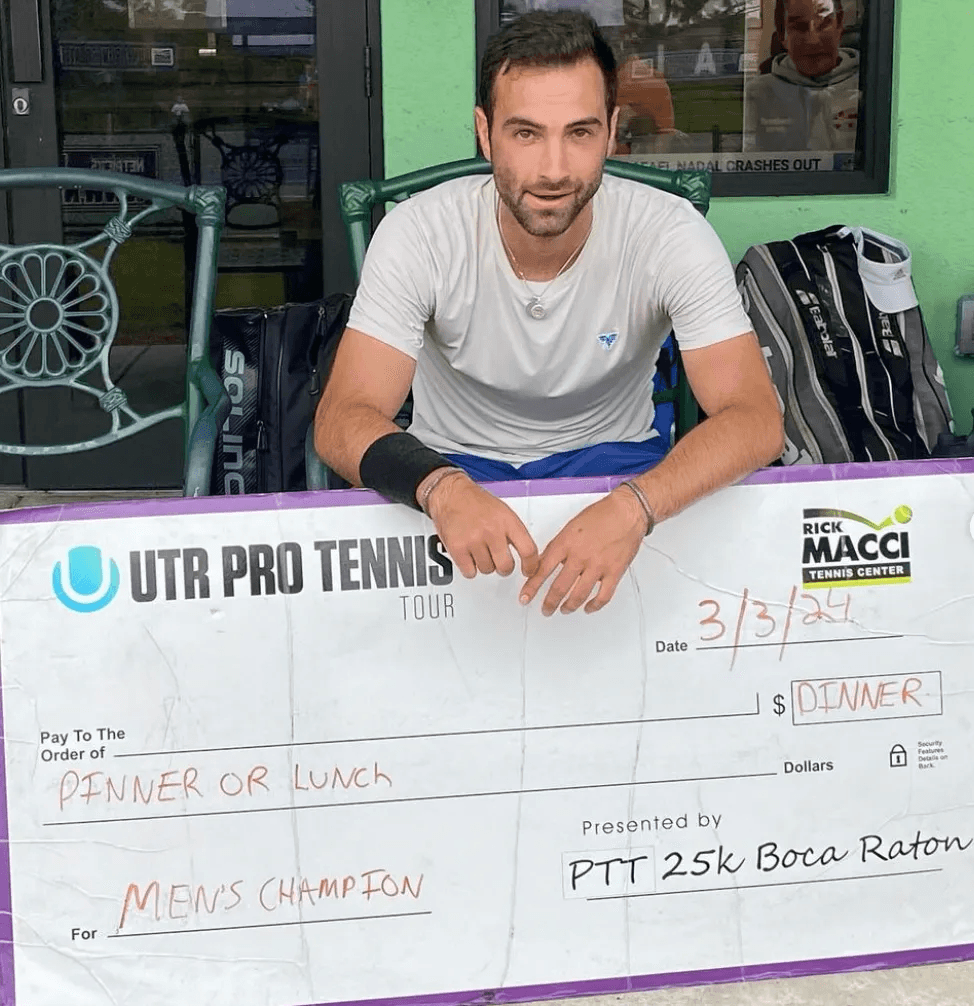
A symbolic check won by Noah Rubin at a UTR event in Florida earlier this year. Rubin would eventually reach his career high of No. 125 in the rankings in October 2018, but hovered around No. 200 for most of his career — not high enough, he estimates, to ever break even on tour.
So, five years later, has the newly married, newly minted TV-personality found fulfilment? It’s hard to say, but “whenever I am grumpy about watching someone else live out a dream of mine, my wife likes to remind me of the years when people were complementing me to my face, but I was struggling on a daily basis.
“I still miss it. But now I remember how quickly society can glamorize something that isn’t especially good for you — and that people have different journeys.”
Things we love: Jessica Pegula’s subway series segments on her Instagram, in which the top-American and daughter of billionaires, departs Penn Station to Flushing Meadows via the Long Island Railroad, or grabs the 7 train from Grand Central. (Most players stay in Midtown Manhattan, but take Open-provided car rides.) “Why am I taking the metro? I don't like taking a car and I like trains,” Pegula says. She also reminisced about her junior days when she would sometimes take the train to the courts. “My agent makes fun of me for not wanting to take a nice car,” Pegula says.
“We actually went to Flushing [by car] one time; it took like an hour and a half in the car and I wanted to like throw up. I was ready to like, jump out of the car and walk to the site. On the way back we took the subway.”
Things we find annoying: Journalist grandstanding. During the beginning of the Open, journalist Ben Rothenberg announced his GoFundMe page to “Finish His Legal Battle for a Free Press.” It was really to raise about $30,000 for his legal defense team in the defamation lawsuit that player Alexander Zverev launched against the muckraker tennis journalist in 2021 for writing two damning story about the domestic abuse allegations against Zverev — without police reports filed or even secondary sources, outside a Russian family in New Jersey. One ran in Slate, while the other in the previous iteration of Racquet magazine. Rothenberg later appeared in an article in the Washington Post, detailing his plight and questioning whether he would stay in journalism. Post-article, he has been Tweeting all week from the U.S. Open.
Special thanks to Rally ambassador, Noah Rubin, for his support in discovering and creating a new way for New Yorkers to book courts and play tennis in the world’s favorite city.
Noah Rubin of Behind the Racquet tennis podcast at the at Lotte New York Palace Hotel for the 2023 Taste of Tennis with Venus Williams and her sister, Isha Price, the team supporting his new docu-series of the same name.
There was a seminal moment in the life of tennis player Noah Rubin in which the journeyman player decided that he needed to trade the instrument usually found in his right hand, for another.
Alone in a hotel one early morning in September 2018 before the first round of his next Challenger tournament — a stop on the endless week-in, week-out grind of chasing rankings points — Rubin had a think. He had just come off his best summer yet, beaten John Isner and “made some money, finally,” but something was still missing. “Was it trophies, more money, safety, I didn’t know, but I definitely didn’t have what I was looking for.” He hit a plateau, and anxiety and depression set in.
“I was working so hard, but the ranking system doesn’t reward anything but what you have done lately,” Rubin says on a phone call from his home in New York. “You win some points and you have to defend those points in the next month, so it’s constant stress. I said to myself, ‘it’s time to pull back the curtain; we’re all dealing with this, so why isn’t anyone saying anything?’”

Noah Rubin, as the first official subject of his Behind the Racquet podcast, which he started in January 2019. “To let down the people closest to me, my friends and family, is my most daunting fear,” he revealed. “From an early age I was pretty aware about how many lives I affected. How many people had to sacrifice time, energy and money. The idea that it may not be worth it, or there might not be a way to repay them, haunts me at times. It’s what will take me to that next level, or break me, but to impact the world you cannot let that happen and I won’t.”
At first, Rubin downloaded a recording app and started taking his I-phone to the courts to record the stories of his friends on tour for an Instagram page. A few months later, he met fellow Long Islander, Zach Mitchell, then a producer in Los Angeles, and Rubin bought a microphone, a mixer and a podcast space to create Behind the Racquet, a podcast that “pulls back the curtain” on tennis players from World No. 1, Iga Świątek to doubles specialist, Marcus Willis, to community standout and coach, Jolene Watanabe, who passed away from cancer a few years ago. With five years of podcasting under his belt — always with play-by-play commentator and pundit Mike Cation on the other mike — Mitchell and Rubin have now set out to create the original product: a Behind the Racquet docuseries partnering with Wondermind, the company owned by sisters Venus Williams and Isha Price.
“The podcast has touched me in ways I would never have known had I remained just a player,” Rubin says. “I still get choked up thinking about the episode we did with Jolene and how after she died, her husband called and thanked us for doing it. Thanked us. Her story was so incredible and that all of it has come about from some dumb idea I had at 2 a.m. — unable to sleep in my hotel room before another tournament — still amazes me.”

A pensive and pondering young Noah Rubin somewhere on the junior tour in Europe. The wunderkind from Long Island reached a career high of ITF Juniors No. 6 and at age 18 won the Junior Wimbledon title.
U.S. Open update: At some point in New York, all residents experience a bump on the subway or a step on the foot and a “F*^k you, no, f^#k you, no f^*k your mother, no yours,” exchange takes place. This U.S. Open Labor Day weekend had the equivalent of that sentiment at Rubin’s old stomping ground, the Billie Jean King Tennis Center in Flushing Meadows.
For starters, there was the grilling that Coco Gauff coach Brad Gilbert received from fellow ESPN pundit Rennae Stubbs over Gauff’s stunning exit in the fourth round after the third-seed — and 2023 champion — Gauff hit more double faults (19) than winners (14) on Sunday. “Where is Coco's confidence?,” Stubbs asked Glibert. “There’s no second serve… And that’s a problem. So under pressure, bad technique breaks down and her technique is… hard for me to say because Brad is sitting here… but her technique, the elbow, is too low, the grip is a little weird as well.” Gilbert, who couldn’t really defend himself, also raised questions about coaches being commentators. No word from the Coco camp, but many have called on her to axe him, including player-turned-pundit, Nick Kyrgios.
Next up, the Kazakh-Russian tennis player Yulia Putintseva’s stand-off with a U.S. Open ball girl, in which the ball girl tossed balls to a rude Putintseva, who just let them drop as she glared at the poor adolescent in rainbow Ralph Lauren kit. Putintseva lost to this year’s stand-out, the joyful Jasmine Paolini, who has become the poster girl for U.S. Open fun. Lastly, there was the double-handed backhand that No. 1 seed Iga Świątek took from Russian Anastasia Pavlyuchenkova — straight to the gut. Pavlyuchenkova apologized after the match, but following a summer of such tactics from Danielle Collins and others, Iga is feeling a bit of a target. But the tactic simply fired up the Polish introvert, who enacted her revenge by taking out Pavlyuchenkova 6-2, 6-4. The word is still out on how Serena Williams’ Monday hangover resolved after sucking down the signature Honey Deuce cocktail while watching it all.

Rubin signs balls after a Behind the Racquet exhibition match.
Monday, however, brought the end of the fourth round with quarterfinals decided. Brazilian Beatriz Haddad Maia fought off returning retiree Caroline Wozniacki to earn the spot against Karolina Muchová, who undid fan fav Paolini. One of two American woman left standing, Jessica Pegula, will try to fight off Iga Świątek to avoid that last subway ride home. Aryna Sabalenka and Qinwen Zheng will do big forehand battle, with a dual between Emma Navarro and Paula Bedosa. For the men, quarter-final veterans Jannik Sinner and Danill Medvedev face off, as well as Taylor Fritz and Alexander Zverev. Alex de Minaur, whose 2024 Grand Slam runs all ended in the quarter-finals, takes on newbie quarter-finalist and Britain’s Next Great Hope, Jack Draper. Lastly, Francis Tiafoe looks to repeat his 2023 semi-final success against Grigor Dimitrov.
Back to Rubin: Born and raised in Long Island by tennis loving parents, Rubin started hitting balls at age one, literally a year after his parents — Eric, a banker, and Melanie, an educator — bought a junior racquet before their son was born. Childhood brought him to the John McEnroe Tennis Academy, where another Long Island son trained and prepared Rubin to be the best of the best. Rubin, who lived, breathed and even bar mitzvahed tennis, ascended quickly, winning major titles across the U.S and in 2014, defeated current ATP No. 12 Taylor Fritz en route to the Wimbledon boys singles title, ending a seven-year American drought at the competition. That year, he also won the USTA junior national championship titles in both singles and doubles before deciding to put off going pro and attend college at Wake Forest University.
After two years in North Carolina, however, Rubin felt a bit of FOMO for Fritz and the other guys on tour and decided to follow them, even after coming just a few points from winning the NCAA Championship. But the big dance proved different from his expectations. “Tennis is so demanding — so mentally and physically demanding — and unless you are wealthy or exceptional, you are on your own,” Rubin says. “It’s also a very self-centred sport, which requires thinking of yourself as number one most of the time — something that is difficult for people like me, who have other interests. You just don’t have this thought to go out of your way.”

Noah Rubin after junior standout and protege, Sean Grosman, 17, and Zavier Augustin teamed to win an ITF Doubles Title in Guadeloupe earlier this year.
Inspired by the series, Humans of New York, Rubin started his Behind the Racquet Instagram and within just a few months, caught the attention of Zach Mitchell, yet another Long Island son who was living in Los Angeles and working as an assistant to Michael Douglas at Furthur Films. Mitchell saw the potential in Behind the Racquet straight away, envisioning it on TV. He dropped Rubin a DM on Instagram, and after the struggling player responded, Mitchell drove to the March 2019 BNP Paribas Open in Palm Springs to pitch his idea to Rubin — straight after Rubin lost his first-round match. “I went up to him probably not realizing it wasn’t the best time to talk to a player, but I shot my shot. He was so gracious and we had dinner later that night,” Mitchell says. “It was one of those, ‘when you have nothing to lose just go for it,’ moments.
“But Noah is one of a kind among tennis players — he is so full of charisma, tenacious, and smarter than the average tennis player. I knew he could pull this off.”
Rubin stayed on tour a while longer and planned on both playing and podcasting, but the Covid pandemic changed everything. Resources and tournaments dried up, and even Stan Wawrinka was stuck at home playing video games. Rubin threw himself into his Behind the Racquet work and even started speaking out on behalf of other players to effect change in the sport, especially at the lower levels. “There was an explosion in online programming, and it became apparent through programs like Cheer (about cheerleading) on Netflix that people who might not necessarily care about the sport, care about the issues behind the sport,” Rubin says. “Tennis is such a massive sport, but the storytelling not there. Players are not just their struggles; they are people overcoming their struggles on a daily basis — they are similar and different. However, we can all connect to them.”
For the past several months, Rubin, who once aimed to compete in pickleball, has been coaching, podcasting and shooting a pilot for his series. After the Open, where he is coaching Jack Kennedy, another Long Island native, Rubin and his team, including Peabody Award-winning and Emmy-nominated director and cinematographer Rex Miller (Citizen Ashe), will be pitching the series to television executives. Each one-hour episode will contain three player vignettes, giving viewers a 360-degree view of the sport from recreational players to pros at the top. Aiming to raise awareness and destigmatize conversations about the challenges athletes face on and off the court, the series will explore, among other themes, such matters as grief, anxiety, disability, body image, disordered eating, family and sexual orientation.

A symbolic check won by Noah Rubin at a UTR event in Florida earlier this year. Rubin would eventually reach his career high of No. 125 in the rankings in October 2018, but hovered around No. 200 for most of his career — not high enough, he estimates, to ever break even on tour.
So, five years later, has the newly married, newly minted TV-personality found fulfilment? It’s hard to say, but “whenever I am grumpy about watching someone else live out a dream of mine, my wife likes to remind me of the years when people were complementing me to my face, but I was struggling on a daily basis.
“I still miss it. But now I remember how quickly society can glamorize something that isn’t especially good for you — and that people have different journeys.”
Things we love: Jessica Pegula’s subway series segments on her Instagram, in which the top-American and daughter of billionaires, departs Penn Station to Flushing Meadows via the Long Island Railroad, or grabs the 7 train from Grand Central. (Most players stay in Midtown Manhattan, but take Open-provided car rides.) “Why am I taking the metro? I don't like taking a car and I like trains,” Pegula says. She also reminisced about her junior days when she would sometimes take the train to the courts. “My agent makes fun of me for not wanting to take a nice car,” Pegula says.
“We actually went to Flushing [by car] one time; it took like an hour and a half in the car and I wanted to like throw up. I was ready to like, jump out of the car and walk to the site. On the way back we took the subway.”
Things we find annoying: Journalist grandstanding. During the beginning of the Open, journalist Ben Rothenberg announced his GoFundMe page to “Finish His Legal Battle for a Free Press.” It was really to raise about $30,000 for his legal defense team in the defamation lawsuit that player Alexander Zverev launched against the muckraker tennis journalist in 2021 for writing two damning story about the domestic abuse allegations against Zverev — without police reports filed or even secondary sources, outside a Russian family in New Jersey. One ran in Slate, while the other in the previous iteration of Racquet magazine. Rothenberg later appeared in an article in the Washington Post, detailing his plight and questioning whether he would stay in journalism. Post-article, he has been Tweeting all week from the U.S. Open.
Special thanks to Rally ambassador, Noah Rubin, for his support in discovering and creating a new way for New Yorkers to book courts and play tennis in the world’s favorite city.

Adrian Brune
Content

























